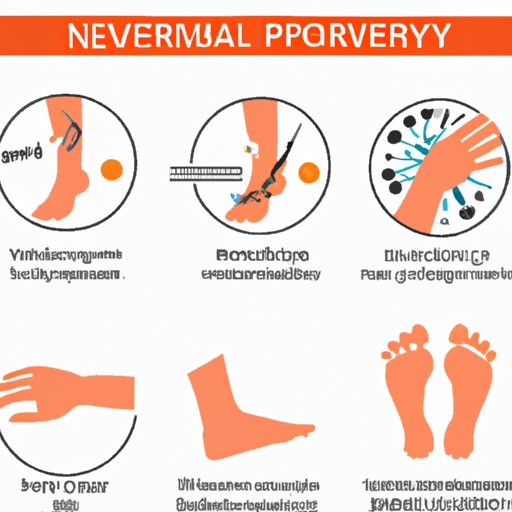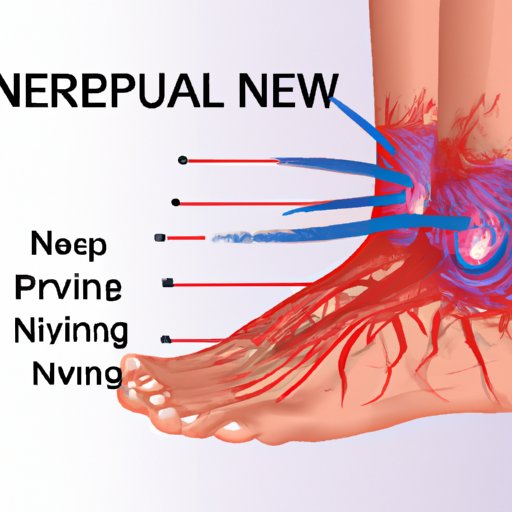
Introduction
Severe neuropathy is a debilitating condition that can severely impact an individual’s quality of life. It is a condition that affects the peripheral nervous system and can cause a range of symptoms that can be distressing and overwhelming. It is important to recognize the symptoms of severe neuropathy to ensure early diagnosis and treatment. In this article, we will explore the warning signs of severe neuropathy, how to recognize the symptoms of this condition, and strategies to manage them.
7 Warning Signs of Severe Neuropathy You Should Never Ignore
Severe neuropathy can cause a range of symptoms that may vary depending on the underlying cause and the individual’s medical history. Some of the most common warning signs of severe neuropathy include:
- Pain or discomfort: Individuals with severe neuropathy may experience pain, burning, tingling, or numbness in the affected area.
- Muscle weakness: Severe neuropathy can cause muscle weakness, which can make it difficult to perform simple tasks such as opening jars or gripping objects.
- Balance problems: Individuals with severe neuropathy may experience difficulty in maintaining balance, and they may be at an increased risk of falls and injuries.
- Loss of coordination: Severe neuropathy can also lead to loss of coordination and dexterity in the affected area.
- Changes in skin temperature: Changes in skin temperature, such as cold or heat intolerance may be a warning sign of severe neuropathy.
- Loss of sensation: Individuals with severe neuropathy may experience loss of sensation in the affected area, causing difficulties with daily activities like cooking and washing.
- Gastrointestinal problems: Severe neuropathy can also cause gastrointestinal problems such as bloating, diarrhea, and constipation.
If you are experiencing any of these symptoms, it is important to seek medical attention right away to determine the underlying cause and receive appropriate treatment.
How to Recognize the Symptoms of Severe Neuropathy
It can often be challenging to identify the symptoms of severe neuropathy, as many of these symptoms are also associated with other health conditions. However, there are a few key things to look out for, including:
- Difficulty in performing simple tasks due to loss of coordination
- Changes in skin temperature, such as cold or heat intolerance, or changes in skin color.
- Tingling or numbness in the affected area
- Muscle weakness or a loss of sensation
- Unexplained pain or discomfort in the feet, legs, hands, or arms.
- Loss of reflexes and abnormal reflexes
- Gastrointestinal symptoms, such as bloating, diarrhea, constipation, and nausea
It is important to remember that these are just a few of the many symptoms that can occur with neuropathy and a professional diagnosis from a medical expert is necessary to confirm the diagnosis and start the correct treatment.
The Ultimate Guide to Identifying Severe Neuropathy Symptoms
If you suspect that you may be experiencing symptoms of severe neuropathy, it is important to take a step-by-step approach to assess the symptoms and determine the underlying cause. Here are a few tips and strategies to help you get started:
- Consult with a healthcare professional: If you are experiencing any of the symptoms of severe neuropathy, it is essential to speak with a healthcare professional as soon as possible. A trained physician can evaluate your symptoms and perform the necessary tests to confirm a diagnosis.
- Keep a symptom diary: Write down any symptoms or changes you are experiencing, as well as when they start and finish.
- Maintain a healthy lifestyle: By exercising regularly, maintaining a healthy diet, and managing stress through relaxation techniques and therapy, you can help manage your neuropathy symptoms.
- Educate yourself: Educate yourself about your condition and the treatment options available through medical journals and reputable websites. Knowing how to manage and treat neuropathy can help you feel more in control of your symptoms and further improve your quality of life.

What You Need to Know About Severe Neuropathy and Its Symptoms
Severe neuropathy can occur for several reasons, including a lack of certain vitamins and minerals in your diet, traumatic injuries, and chronic diseases like diabetes. Risk factors for this condition include being over the age of 40, obesity, alcohol abuse, smoking, and a family history of neuropathy.
The condition may lead to a few complications that may cause even further distress such as burning sensation in the affected area, joint pain, muscle wasting, and difficulty walking.
From Tingling to Numbness: Understanding the Progression of Severe Neuropathy Symptoms
Severe neuropathy symptoms may develop gradually, starting with mild symptoms such as tingling and burning sensations in the affected area. These sensations may then progress to numbness and loss of sensation. In some severe cases, neuropathy can cause muscle weakness, paralysis, and bowel and bladder problems. Monitoring these symptoms closely and seeking medical attention when they arise is critical to managing the symptoms of severe neuropathy.
The Top 5 Symptoms of Severe Neuropathy and How to Manage Them
This section of the article describes the top five symptoms of severe neuropathy that are most commonly encountered and how to manage them:
- Pain: Over-the-counter medications like ibuprofen or aspirin can help minimally with the pain, but severe cases may require prescription medication or corticosteroids.
- Numbness and Tingling Sensations: Wearing loose shoes or diabetic shoes, which are designed to minimize calluses, blisters and provide more support can help relieve these symptoms.
- Muscle Weakness: Physical therapy or exercises, which help build strength without causing pain or aggravating your symptoms, can be prescribed by a doctor.
- Bowel and Bladder Problems: There are prescription medications available to relieve these symptoms, among others that can be managed by following a balanced diet.
- Balance Problems: Wearing proper footwear or using a cane or walker can help improve balance and prevent falls.
A Comprehensive List of Severe Neuropathy Symptoms and Possible Causes
Neuropathy can be common in individuals with underlying medical conditions such as diabetes, cancer, and autoimmune disorders. There are hundreds of possible underlying causes of severe neuropathy. This section contains a comprehensive list of possible symptoms and causes. Ensure to consult your doctor to determine the underlying cause as the first step to establishing appropriate treatment
Common Symptoms of Severe Neuropathy include:
- Feeling prickly, burning, or tingling sensation in the affected area
- Sharp, electrical pain
- Weakness in the limb or affected area
- Numbness
- Hypersensitivity, which can occur following injury to the area
- Muscle twitching
- Temperature sensitivity in the affected area.
Possible Causes of Severe Neuropathy include:
- Diabetes
- Trauma or injury
- Vitamin deficiency
- Chemotherapy or radiation
- Thyroid conditions
- Alcoholism
- Multiple sclerosis
- Parkinson’s disease
- HIV/AIDS
Conclusion
Severe neuropathy is a complex condition that can severely impact an individual’s quality of life. Early diagnosis and treatment are critical to managing the symptoms of neuropathy effectively. By familiarizing yourself with the warning signs of severe neuropathy, understanding the possible causes, and implementing strategies to manage your symptoms, you can manage your condition and improve your quality of life.
If you suspect that you have symptoms of severe neuropathy, it is important to seek medical attention as soon as possible. By working with a healthcare professional and creating a comprehensive treatment plan, you can successfully manage your condition and prevent complications in the long run.





